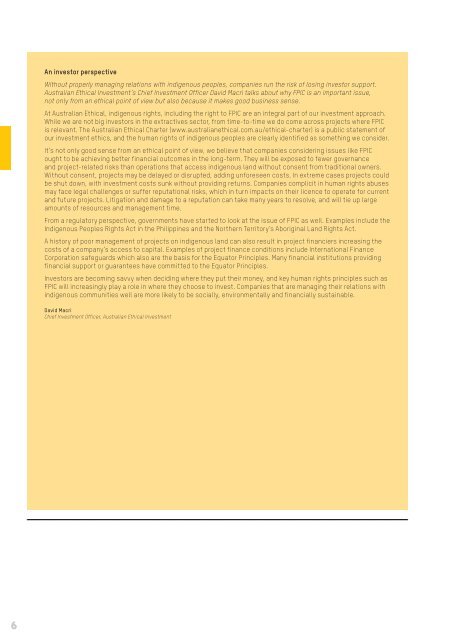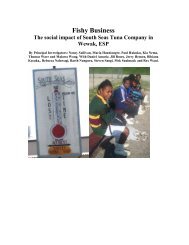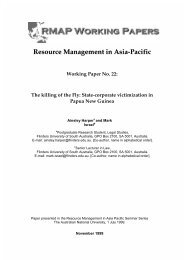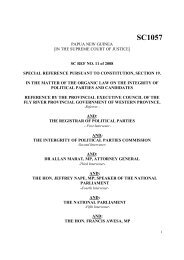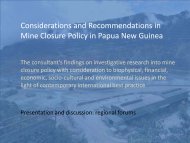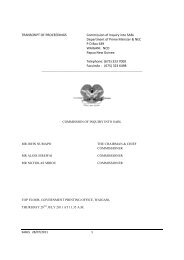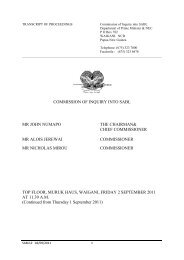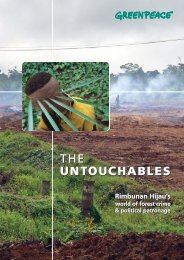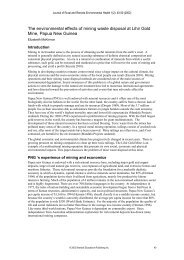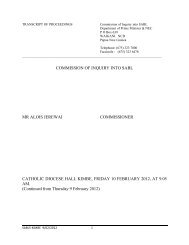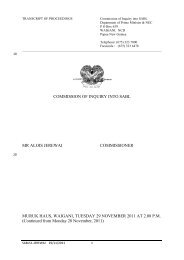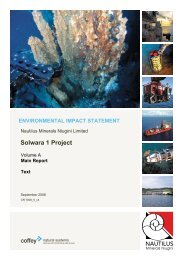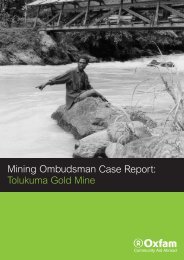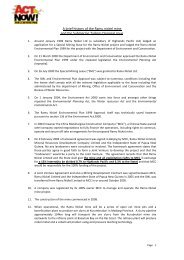Oxfam Australia and CAER: The right to decide
Oxfam Australia and CAER: The right to decide
Oxfam Australia and CAER: The right to decide
You also want an ePaper? Increase the reach of your titles
YUMPU automatically turns print PDFs into web optimized ePapers that Google loves.
An inves<strong>to</strong>r perspective<br />
Without properly managing relations with indigenous peoples, companies run the risk of losing inves<strong>to</strong>r support.<br />
<strong>Australia</strong>n Ethical Investment’s Chief Investment Officer David Macri talks about why FPIC is an important issue,<br />
not only from an ethical point of view but also because it makes good business sense.<br />
At <strong>Australia</strong>n Ethical, indigenous <strong>right</strong>s, including the <strong>right</strong> <strong>to</strong> FPIC are an integral part of our investment approach.<br />
While we are not big inves<strong>to</strong>rs in the extractives sec<strong>to</strong>r, from time-<strong>to</strong>-time we do come across projects where FPIC<br />
is relevant. <strong>The</strong> <strong>Australia</strong>n Ethical Charter (www.australianethical.com.au/ethical-charter) is a public statement of<br />
our investment ethics, <strong>and</strong> the human <strong>right</strong>s of indigenous peoples are clearly identified as something we consider.<br />
It’s not only good sense from an ethical point of view, we believe that companies considering issues like FPIC<br />
ought <strong>to</strong> be achieving better financial outcomes in the long-term. <strong>The</strong>y will be exposed <strong>to</strong> fewer governance<br />
<strong>and</strong> project-related risks than operations that access indigenous l<strong>and</strong> without consent from traditional owners.<br />
Without consent, projects may be delayed or disrupted, adding unforeseen costs. In extreme cases projects could<br />
be shut down, with investment costs sunk without providing returns. Companies complicit in human <strong>right</strong>s abuses<br />
may face legal challenges or suffer reputational risks, which in turn impacts on their licence <strong>to</strong> operate for current<br />
<strong>and</strong> future projects. Litigation <strong>and</strong> damage <strong>to</strong> a reputation can take many years <strong>to</strong> resolve, <strong>and</strong> will tie up large<br />
amounts of resources <strong>and</strong> management time.<br />
From a regula<strong>to</strong>ry perspective, governments have started <strong>to</strong> look at the issue of FPIC as well. Examples include the<br />
Indigenous Peoples Rights Act in the Philippines <strong>and</strong> the Northern Terri<strong>to</strong>ry’s Aboriginal L<strong>and</strong> Rights Act.<br />
A his<strong>to</strong>ry of poor management of projects on indigenous l<strong>and</strong> can also result in project financiers increasing the<br />
costs of a company’s access <strong>to</strong> capital. Examples of project finance conditions include International Finance<br />
Corporation safeguards which also are the basis for the Equa<strong>to</strong>r Principles. Many financial institutions providing<br />
financial support or guarantees have committed <strong>to</strong> the Equa<strong>to</strong>r Principles.<br />
Inves<strong>to</strong>rs are becoming savvy when deciding where they put their money, <strong>and</strong> key human <strong>right</strong>s principles such as<br />
FPIC will increasingly play a role in where they choose <strong>to</strong> invest. Companies that are managing their relations with<br />
indigenous communities well are more likely <strong>to</strong> be socially, environmentally <strong>and</strong> financially sustainable.<br />
David Macri<br />
Chief Investment Officer, <strong>Australia</strong>n Ethical Investment<br />
6


